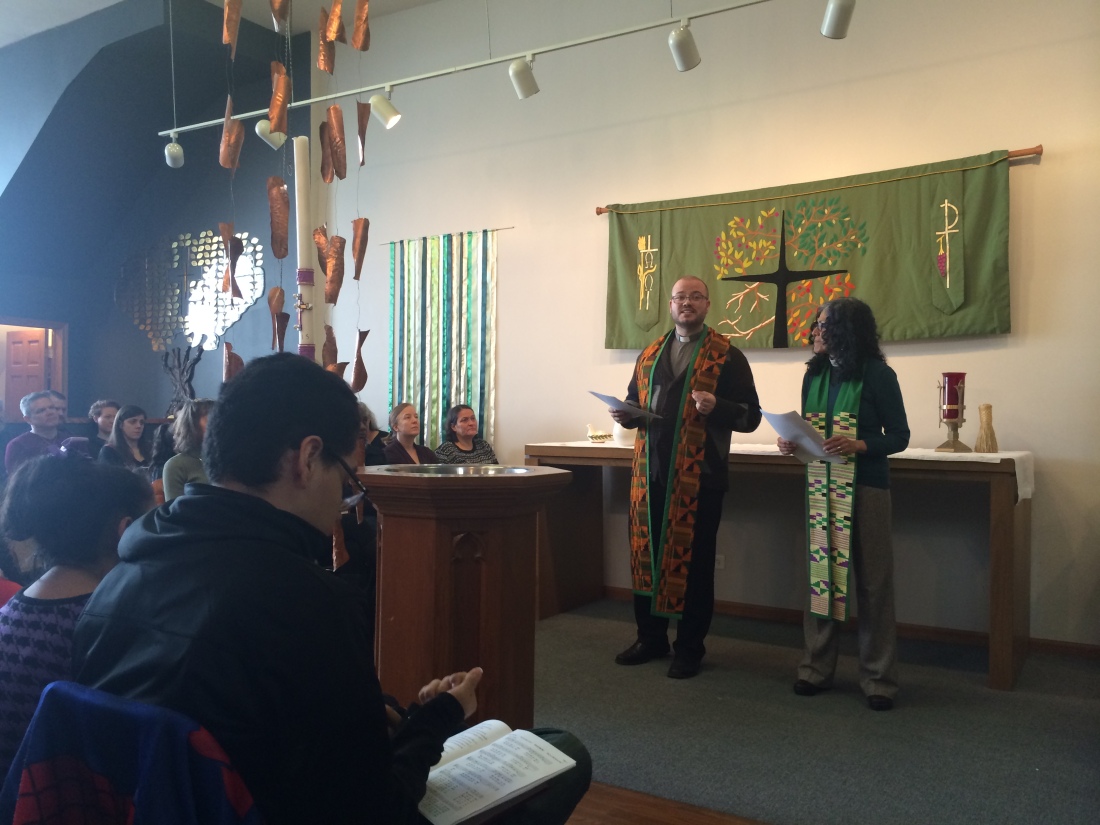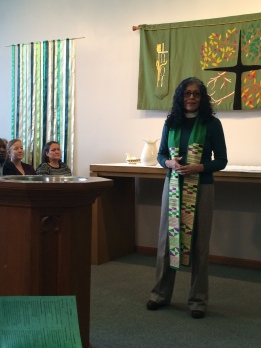[The following are portions of a sermon that was jointly preached by Pastor Erik Christensen (St. Luke’s Lutheran Church of Logan Square) and Pastor Liz Muñoz (Nuestra Señora de las Americas). Because Pr. Liz’s portions were preached extemporaneously, only Pr. Erik’s portions are provided here. Missing from this transcript are the moments of improvised interaction between the two on what was an entirely delightful Sunday morning of bilingual ecumenical worship celebrating a new partnership between the two congregations.]

Text: 1 Corinthians 12:12-31a
“For in the one Spirit we were all baptized into the one body — Jews or Greeks, slaves or free — and we were all made to drink of the one Spirit.” (1 Cor. 12:13)
This is the end of the Week of Prayer for Christian Unity. All around the world, in Roman Catholic cathedrals and Protestant college chapels, in citywide ecumenical prayer services and Sunday morning gatherings just like ours, Christians are coming together to acknowledge the fact that — although Christ has prayed for our unity, that we would be one as Jesus and the one he called Father are one (John 17:21) — we, the body of Christ, the church, have not been unified in our witness to the forgiveness and the love that defined Jesus’ ministry.
When the apostle Paul wrote this letter to the church in Corinth, he was writing to a community that was being torn apart by its differences. He writes, “for in the one Spirit we were all baptized into one body — Jews or Greeks, slaves or free — and we were all made to drink of one Spirit.” Jews or Greeks, slaves or free. He’s not talking about minor differences. He’s not talking about some of us being Lutherans and others of us being Episcopalians; some of us enjoying incense, others not so much; some of us singing hymns in four part harmony with gusto, others not so much. He’s not talking about the little things that divide us. He’s talking about the big things that divide us. Jews or Greeks: Race. Slaves or free: Wealth.
The church at Corinth gets a bad rap, often being described as the most dysfunctional congregation in the New Testament. But, you know what they had going for them? The had both Jews and Greeks in their congregation — people of different ethnic backgrounds. They had both slaves and free people in their congregation — people of different class backgrounds and levels of wealth. Of course their community was full of conflict! They were trying to create a society completely different from anything they’d ever seen before, the kind of community where people who’d been told their whole lives that they had nothing to do with each other could come and be washed in the same waters and eat from the same table and drink from the same cup and bear the same name: child of God.
As dysfunctional as they were, at least the church in Corinth was still trying to live out the full implications of the vision Jesus had cast for the world that was coming into view: a world of good news for the poor, and release for the captives, and sight for those blinded by racial privilege and wealth, and freedom for those who’d endured oppression. Today we know that Sunday morning worship remains one of the most segregated hours of American life (and that even includes the Oscars). Today the body of Christ rarely even tries to bridge the gap between Jew and Greek, slave or free. Anglo and Latino. Rich and poor.
But Paul says, “we were all baptized into one body … and we were all made to drink of one Spirit.” (1 Cor. 12:13) We share the same sacraments as a sign that we remember, however old and dim the memory, we remember that in Christ we belong to each other. And we have gathered this morning, at the beginning of a new day, at the dawn of a new partnership between our two congregations, because we know that our future together needs to be better than our separate pasts. Because we need each other the way the eye needs an ear, the way a hand needs its feet.
+++
 “But God has so arranged the body, giving the greater honor to the inferior part, that there may be no dissension within the body, but the parts may have the same care for one another.” (1 Cor. 12:24b-25)
“But God has so arranged the body, giving the greater honor to the inferior part, that there may be no dissension within the body, but the parts may have the same care for one another.” (1 Cor. 12:24b-25)
[Pastor Liz Muñoz preaches on this verse in Spanish.]
+++
“Now you are the body of Christ and individually parts of it.” (1 Cor. 12:27)
My first inclination is to read this verse with the emphasis on the word “you.” “Now you are the body of Christ …” But I wonder what it would mean if the emphasis were on the word “now.” Now you are the body of Christ …
We are the body of Christ, because we are God’s baptized people. We are the body of Christ whenever we eat at the table of God’s forgiveness and mercy. Now, already, we are the body of Christ. The body of Christ that rose from the dead but still had pierced hands and a gash in the side, so that Thomas could touch them and know that his suffering Lord brought life and healing to even those wounds everyone thought could never be healed. Even racism. Even classism. Even nationalism. Even sexism. Even heterosexism. Even ablism. Even the ways we kill each other that we’ve not yet learned to name. Our God brings life and healing to people and places left for dead, now. Not someday.
We don’t become the body of Christ once we finally solve all these problems. We are the body of Christ now. This is what God’s promise of shalom, what God’s peace, looks like. First attempts. Awkward efforts. Nervous energy. Joyful noise. Surprising gifts. Delightful discoveries. Renewed enthusiasm. Shared mission. Disappointing setbacks. Hopeful dreams. A new creation.
And we each bring something different, something necessary and unique, to God’s plan to save the world. God is not bringing to birth the kind of world where every person and every place is the same. God is not bridging the gap between Jew and Greek, slave and free, so that we can remain segregated, keeping the gifts God has placed in each of us to ourselves. Paul calls us “members of one body” to remind us that we each have beautiful, necessary gifts that find their purpose only when they are shared. Christian unity is not Christian uniformity. There is room in our worship for the Book of Common Prayer and the new red Lutheran hymnal. There is room on our walls for the paraments that have draped our altars and the Virgin of Guadalupe. More importantly, there is room in our shared life for trial and error, for the benefit of the doubt, for generous hospitality and shared wisdom and a willingness to experiment.
We are already the thing we wonder if we might become. Now we are the body of Christ, and individually parts of it.
+++
“But strive for the greater gifts.” (1 Cor. 12:31a)
[Pastor Liz Muñoz preaches on this verse in Spanish.]